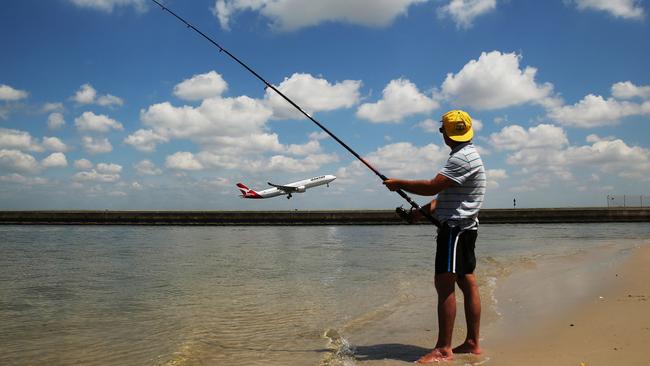Qantas and travel companies ready for takeoff
Analysts are now predicting a “travel boom” when borders reopen after the coronavirus pandemic.

Analysts are now predicting a “travel boom” when borders reopen after the coronavirus pandemic.
Qantas, Sydney Airport, Flight Centre and Webjet are some of the travel companies in the spotlight after the government’s tourism stimulus package announced last week.
Citi and Macquarie upgraded Qantas to “buy” and “overweight” respectively on Monday.
Macquarie also increased its model share portfolio exposure to companies in the insurance and energy sectors and others that it expects to benefit from a travel boom when borders reopen.
“We think vaccinations and pent-up demand, supported by a drawdown of savings, will drive a travel boom,” says Macquarie’s Australian equity strategist, Matthew Brooks.
“Just as many retailers had like-for-like sales growth of 20 per cent-plus in 2020, we think the travel industry could see the same after international borders open.”
Qantas shares rose 3.8 per cent to a three-month high of $5.50.
It came as the sharemarket brushed off another jump in government bond yields.
The benchmark S&P/ASX index closed up 0.1 per cent at 6773 — its highest daily close in almost three weeks — after the Dow Jones hit a record high for a third day running on Friday. The S&P 500 set a record high on a daily closing basis for a second consecutive day.
But the growth-heavy NASDAQ 100 index fell 0.6 per cent as the US 10-year bond yield jumped 10 basis points to a 13-month high of 1.64 per cent as US President Joe Biden’s massive $US1.9 trillion ($2.5 trillion) fiscal stimulus package was signed into law.
Mr Brooks says the pent-up demand to travel was “huge” after a Trivago survey of more than 2000 US and UK adults last month found that 20 per cent said they would give up their partner to be able to travel again. The survey also found that 25 per cent said they would give up their savings, 38 per cent would give up sex for a year and 48 per cent would give up their job.
Citi airlines analyst Samuel Seow removed his “high risk” rating on Qantas because of “the increased border certainty” (of reopening due to vaccinations) but kept his price target at $6.14 as “we believe a leisure-led recovery is negative for mix”.
“Additionally, our work into prior cost-out programs reveals only negligible impacts on profitability.”
Still, “following the stimulus” has produced some of the best performing trades in the pandemic.
“We’ve constantly seen support overshoot what was required, manifesting in short-term benefits for various companies,” Mr Seow says.
“We believe this government tourism package is no different, and we estimate this stimulus will heat up an already rebounding leisure market.”
Similarly, Macquarie’s airlines analyst David Fabris raised Qantas to outperform and boosted his 12-month target price by 26 per cent to $6.35 a share, saying the airline will enter “balance sheet repair mode in fiscal 2021-22 with improving capacity, initially within domestic, supported by government stimulus and the COVID vaccine, increasing cash generation.
“With a better outlook, it is important to recognise that Qantas has structurally improved the business through COVID, with a higher skew towards the more attractive domestic and loyalty businesses and the cost-out which reduces downside risks within international,” he says.
“For this, investors should consider a rerating, reducing the long-run discount to global peers which has traditionally been around 35 per cent.”
His new price target is based on a 25 per cent discount. He notes Qantas’s key international destinations — covering more than 70 per cent of available seat kilometres — expect the vaccine rollouts to be largely completed by the end of 2021.
Domestic capacity could overshoot pre-COVID levels in the near-term in his view.
Qantas and Flight Centre were both added to Macquarie Equities’ model share portfolio.
Mr Brooks says value stocks more generally should continue their exceptionally strong outperformance since late 2019 versus the broader market and growth stocks in particular.
The value cohort has “more COVID losers, more cyclicals, more stocks that benefit from rising bond yields and more domestic stocks”.
Reflation trades “may pullback after recent gains”, but he thinks the US fiscal stimulus plan combined with a drawdown of savings will “support robust economic activity”, fuelling a surge in consumer spending.
Moreover, bond yields will continue to rise and combined with the ongoing rotation to COVID losers should continue to favour value stocks.
Macquarie’s view is that the US 10-year bond yields will reach at least 2 per cent by the end of 2021, since the ISM index, copper/gold ratio and industrial/utilities stocks ratio suggests the US 10-year should be closer to 2.4 per cent.
“The Fed has been willing to allow higher yields so long as it does not tighten financial conditions too far,” Mr Brooks says.
He also added QBE Insurance, IAG and Janus Henderson to the model portfolio, while also boosting exposure to Westpac, ANZ and Suncorp.
On the expectation of higher yields, he removed CSL and Spark and reduced James Hardie.
He also reduced BHP slightly and removed Fortescue and Rio Tinto from the portfolio to lower iron ore exposure.







To join the conversation, please log in. Don't have an account? Register
Join the conversation, you are commenting as Logout